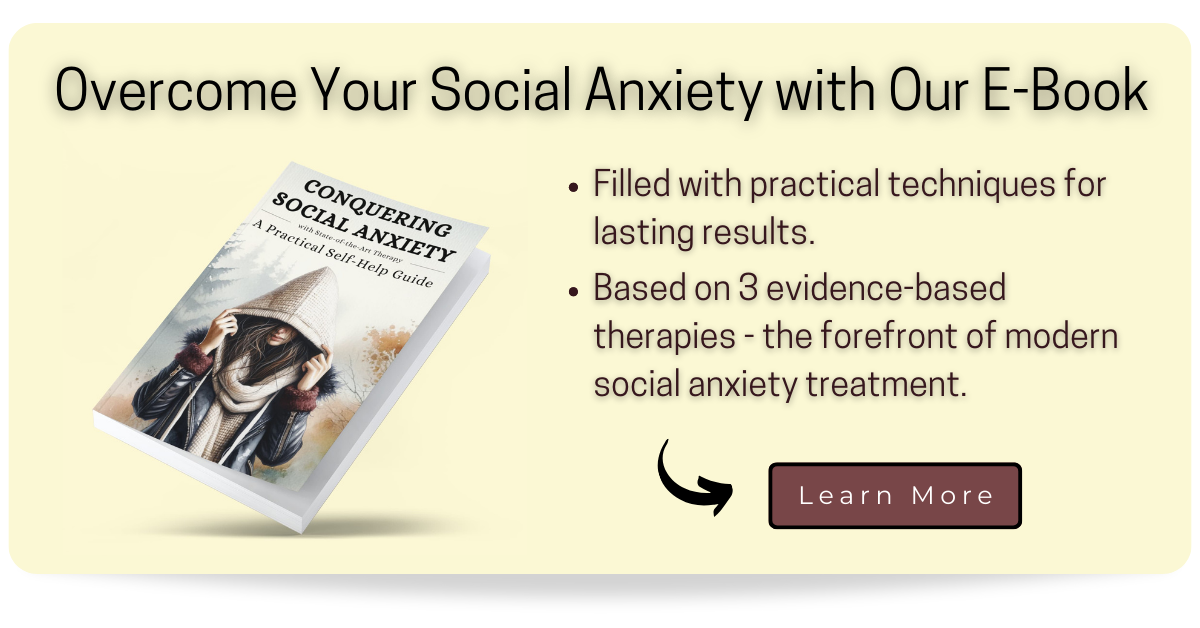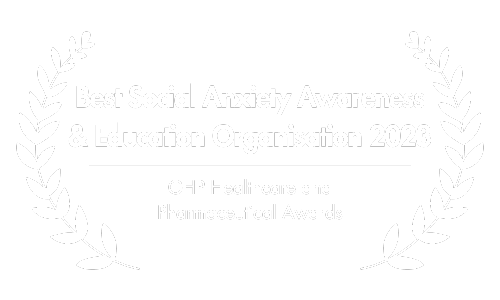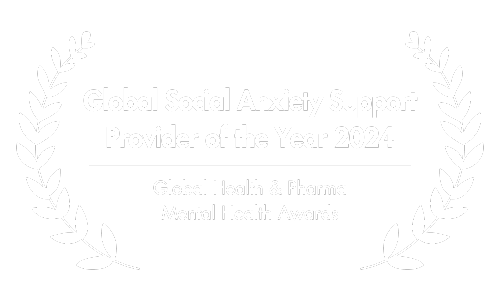A Road Less Traveled: Humanistic-Existential Therapy for Social Anxiety
This article includes recommendations for an online therapy service & several books. Some of our links may grant you a significant discount and we will earn a commission, which supports the maintenance of our website.
Social anxiety is a condition that affects millions of people worldwide, making everyday social interactions a source of immense stress and discomfort.
While Cognitive Behavioral Therapy (CBT) and medications like SSRIs are often the first line of treatment, they are not the only options available.

For those seeking an alternative approach that delves into the complexities of human existence, emotions, and personal growth, Humanistic-Existential Therapy offers a unique perspective.
The aim of this article is to explore Humanistic-Existential Therapy as a less conventional but still valid approach to treating social anxiety.
We will delve into its philosophical underpinnings, discuss why there is a lack of extensive scientific research backing its effectiveness specifically for social anxiety, and present some promising findings that suggest its potential benefits.
Additionally, we’ll provide practical resources for those interested in this form of therapy, including online options and recommended reading.

A. What is Humanistic-Existential Therapy?
Definition and Historical Background
Humanistic-Existential Therapy is a psychotherapeutic approach that combines elements of humanistic and existential psychology.
Rooted in the works of Carl Rogers, Abraham Maslow, and existential philosophers like Jean-Paul Sartre and Viktor Frankl, this therapy aims to help individuals achieve self-awareness, personal growth, and a deeper understanding of their own existence.

Core Principles
The core principles of Humanistic-Existential Therapy include:
- Self-Awareness: Encouraging individuals to become aware of their thoughts, feelings, and behaviors.
- Personal Growth: Fostering an environment where individuals can explore their potential and strive for self-actualization.
- Existential Exploration: Helping individuals confront the existential givens of life, such as death, freedom, isolation, and meaninglessness, to find personal meaning.
How It Differs from Other Therapies
Humanistic-Existential Therapy stands apart from other therapeutic approaches in several key ways:
- Philosophical Underpinnings: Unlike CBT, which is more structured and problem-focused, Humanistic-Existential Therapy delves into philosophical questions about human existence.
- No Formal Diagnosis: This approach often avoids labeling individuals with a formal diagnosis, which can be both liberating and challenging for those seeking treatment for social anxiety.
- Length of Treatment: The duration of Humanistic-Existential Therapy can vary widely and is generally not as time-limited as other forms of therapy like CBT.
- Issues with Insurance Coverage: Due to its less structured nature and the absence of a formal diagnosis, insurance companies may be less likely to cover the costs of this type of therapy.

B. Why the Lack of Scientific Research?
Humanistic-Existential Therapy, despite its rich philosophical roots and individualized approach, has not received as much empirical validation as other forms of therapy like CBT. There are several reasons for this discrepancy:
Less Research Funding Compared to CBT
CBT has been the focus of extensive research partly because its structured, short-term nature makes it easier to study in controlled settings.
Humanistic-Existential Therapy, being more open-ended and philosophical, has not attracted the same level of funding or research interest.

Reluctance to Diagnose
One of the core tenets of Humanistic-Existential Therapy is the avoidance of labeling or diagnosing individuals.
While this can be empowering for the client, it poses challenges for researchers who rely on diagnostic criteria to measure the effectiveness of a treatment, particularly for conditions like social anxiety.
Other Challenges in Empirical Validation
The individualized and existential focus of this therapy makes it difficult to apply standardized measures of success.
The goals of Humanistic-Existential Therapy often extend beyond symptom reduction to include broader aspects of personal growth and existential understanding, which are harder to quantify.

C. Scientific Support for Humanistic-Existential Therapy
While Humanistic-Existential Therapy may not have as extensive a body of research as other approaches, there are studies that suggest its potential effectiveness in treating anxiety disorders, including social anxiety.
Principles and Techniques
The core principles and techniques of Humanistic-Existential Therapy, such as the therapeutic alliance, self-awareness, and existential exploration, have shown promise in treating anxiety disorders.
These elements can help individuals confront their fears, understand their triggers, and develop coping mechanisms that are deeply rooted in their personal values and beliefs.

Core Existential Practice
A study by Hoffman et al. in 2015 emphasized that existential therapy’s focus on relationships, emotions, and meaning has a strong foundation in empirical research and clinical competencies.
This suggests that the existential aspects of Humanistic-Existential Therapy can be particularly effective in addressing the emotional and relational facets of social anxiety.

Meta-Analysis
A meta-analysis conducted by Vos et al. in 2015 reviewed 21 eligible randomized controlled trials of existential therapy. The study found 15 studies with unique data, comprising a total of 1,792 participants.
While the meta-analysis included various forms of anxiety, the findings were generally positive, indicating that existential therapy can be an effective treatment option.
While more research is needed to definitively establish the effectiveness of Humanistic-Existential Therapy for social anxiety, these studies provide a promising starting point.

D. Humanistic-Existential Therapy & Social Anxiety
Humanistic-Existential Therapy offers a unique set of tools and perspectives that can be particularly beneficial for individuals grappling with social anxiety. Here’s how:
Therapeutic Alliance
One of the cornerstones of Humanistic-Existential Therapy is the establishment of a strong therapeutic alliance between the therapist and the client.
This relationship serves as a safe space where individuals can explore their fears and anxieties without judgment, which can be incredibly empowering for those with social anxiety.

Self-Awareness and Personal Growth
Through exercises and dialogues aimed at increasing self-awareness, individuals can gain a deeper understanding of the triggers and thought patterns that fuel their social anxiety.
This heightened self-awareness can be the first step toward meaningful change and personal growth.
Existential Exploration and Finding Meaning
Social anxiety often raises existential questions about one’s worth, the meaning of social interactions, and the fear of judgment.
Humanistic-Existential Therapy encourages individuals to confront these existential concerns head-on.
By doing so, individuals can find a sense of purpose and meaning that transcends their social anxieties, offering a more holistic approach to treatment.

By focusing on these elements, Humanistic-Existential Therapy provides a framework for individuals to explore and address the root causes of their social anxiety, rather than merely managing symptoms.
E. Common Misconceptions
Humanistic-Existential Therapy, while offering a unique and individualized approach to mental health, is often misunderstood. Here are some common misconceptions, particularly in the context of social anxiety:
“It’s Too Philosophical to Be Practical”
While Humanistic-Existential Therapy does delve into philosophical questions about human existence, it is not merely an intellectual exercise.
The therapy aims to apply these philosophical insights to real-world problems, like social anxiety, in a practical and actionable way.

“It Doesn’t Work Because It’s Not Scientifically Proven”
As discussed earlier, the lack of extensive scientific research does not necessarily mean the therapy is ineffective.
Some studies suggest its potential benefits, and many individuals have reported significant improvements in their social anxiety symptoms through this approach.
“It’s Only for ‘Mild’ Cases of Social Anxiety”
While it’s true that Humanistic-Existential Therapy may not be the first choice for severe cases of social anxiety, it can still offer valuable insights and coping mechanisms for individuals across the spectrum of severity.

F. Limitations and Criticisms
While Humanistic-Existential Therapy offers a unique and individualized approach to treating social anxiety, it’s important to acknowledge its limitations and criticisms:
Suitability for Severe Cases
Humanistic-Existential Therapy may not be the first choice for individuals with severe social anxiety who may require more immediate symptom relief.
The therapy’s focus on existential exploration and personal growth may not provide the quick symptom alleviation that some people seek.

Not a One-Size-Fits-All Approach
The philosophical and existential nature of this therapy means it may not resonate with everyone.
Some individuals prefer a more structured and symptom-focused approach, like CBT, to address their social anxiety.
Lack of Insurance Coverage
As mentioned earlier, the absence of a formal diagnosis and the therapy’s less structured nature can make it difficult to secure insurance coverage, potentially limiting its accessibility.
Difficult to Quantify Success
The goals of Humanistic-Existential Therapy often extend beyond symptom reduction, making it challenging to measure its effectiveness using conventional metrics.

G. Online Therapy Option: Talkspace
In today’s digital age, online therapy has become an increasingly popular and accessible option for mental health treatment. One platform that offers Humanistic Therapy online is Talkspace.
What is Talkspace?
Talkspace is an online therapy platform that connects individuals with licensed therapists through a secure and confidential app.
The platform offers a variety of therapeutic approaches, including Humanistic Therapy, making it a convenient option for those interested in this form of treatment.

Why Choose Talkspace for Humanistic Therapy?
- Accessibility: Online therapy breaks down geographical barriers, making it easier for individuals to find a therapist who specializes in Humanistic-Existential Therapy.
- Flexibility: The platform allows for asynchronous communication, meaning you can send messages to your therapist at any time, making it easier to fit therapy into a busy schedule.
- Affordability: While insurance coverage for Humanistic-Existential Therapy can be a challenge, Talkspace often offers more affordable rates than traditional in-person therapy.
For those who resonate with the principles of Humanistic-Existential Therapy but are looking for a more accessible or flexible option, Talkspace may be worth considering.
With Talkspace, you pay monthly, get one live session per week and unlimited chat contact with your therapist – and you’re up and running in no time.
Discover the possibilities offered by Talkspace through the link provided below. Our link grants you access to a special $80 discount code.

H. Recommended Reading
For those interested in delving deeper into the world of Humanistic-Existential Therapy, literature can offer a unique perspective.
While not self-help books per se, the following novels provide a compelling portrayal of the therapeutic process within this framework:
“When Nietzsche Wept” by Irvin D. Yalom (available here)
This novel explores the fictional relationship between Friedrich Nietzsche and Dr. Josef Breuer, a pioneer in the field of psychotherapy.
Through their interactions, the book delves into existential themes and offers a glimpse into the therapeutic process, making it a fascinating read for anyone interested in Humanistic-Existential Therapy.

“The Schopenhauer Cure” by Irvin D. Yalom (available here)
Another work by Yalom, this novel focuses on a therapy group led by a psychotherapist who turns to the philosophy of Arthur Schopenhauer as he confronts his own mortality.
The book provides a rich portrayal of group therapy and explores existential questions, making it a valuable read for those curious about the humanistic-existential approach.
“On Becoming a Person” by Carl Rogers (available here)
This seminal work by one of the founders of Humanistic Psychology outlines the core principles of person-centered therapy, emphasizing the importance of empathy, unconditional positive regard, and self-actualization.

“Man’s Search for Meaning” by Viktor Frankl (available here)
Written by existential psychiatrist Viktor Frankl, this book describes his experiences in Nazi concentration camps and introduces the concept of logotherapy, an existential approach to finding meaning in suffering.
I. Additional Resources
For those looking to explore further, we’ve compiled a list of additional resources that cover various aspects of treating social anxiety:
- Our Comprehensive Therapy Guide: This guide covers all different types of therapy for social anxiety, offering a broad overview to help you find the approach that’s right for you. You can read it by clicking here.
- Our Complete Treatment Guide: Beyond therapy, this guide explores medication options, self-help strategies, and the importance of social support in treating social anxiety. You can read it by clicking here.
- Our Guide to Pharmacotherapy: If you’re considering medication as part of your treatment plan, this guide covers all the medication options, along with their scientific backing, in-depth. You can read it by clicking here.

J. Conclusion
Social anxiety is a complex condition that can significantly impact one’s quality of life.
While conventional treatments like CBT and medication are often effective, they are not the only paths to healing.
Humanistic-Existential Therapy offers a unique, philosophically-rich approach that focuses on self-awareness, personal growth, and existential exploration.
Though it may not be the most researched or universally applicable method, its principles and techniques have shown promise in treating anxiety disorders, including social anxiety.

Its focus on the therapeutic alliance and individualized treatment can offer a deeply personal path to understanding and managing social anxiety.
If you’re seeking an alternative to more traditional forms of therapy, or if you’re interested in exploring the deeper existential aspects of your anxiety, Humanistic-Existential Therapy may be worth considering.
As with any treatment, it’s important to consult with healthcare professionals and consider multiple options to find the approach that’s right for you.
Still have lingering questions? Take a step toward clarity and empowerment by enrolling in our Free 7-day Email Course. We’re dedicated to being your guide on this journey of understanding and growth.

Frankl, V. E. (1959). Man’s search for meaning: An introduction to logotherapy. Beacon Press.
Hoffman, L., Vallejos, L., Cleare-Hoffman, H. P., & Rubin, S. (2015). Emotion, relationship, and meaning as core existential practice: Evidence-based foundations. Journal of Contemporary Psychotherapy: On the Cutting Edge of Modern Developments in Psychotherapy, 45(1), 11–20. https://doi.org/10.1007/s10879-014-9277-9
Rogers, C. R. (1961). On becoming a person: A therapist’s view of psychotherapy. Houghton Mifflin.
Vos, J., Craig, M., & Cooper, M. (2015). Existential therapies: a meta-analysis of their effects on psychological outcomes. Journal of consulting and clinical psychology, 83(1), 115–128. https://doi.org/10.1037/a0037167
Yalom, I. D. (1992). When Nietzsche wept. HarperCollins.
Yalom, I. D. (2005). The Schopenhauer cure. HarperCollins.

About the Author: Martin Stork
Martin is a professional psychologist with a background in physical therapy. He has organized and led various support groups for people with social anxiety in Washington, DC and Buenos Aires, Argentina. He is the founder of Conquer Social Anxiety Ltd, where he operates as a writer, therapist and director. You can click here to find out more about Martin.











